
Another time, another place I might have enjoyed this book. But I read this too soon after "Hard-Boiled Wonderland and the End of the World" and "Aurora" and I'm tired of the existential BS.
 1
1

A good summer read; more novella than novel. In fact, it would have been better and more suspenseful longer.
I liked the characters and would have enjoyed getting to know them better. This book was edited down to the bare bones.
As a cyber-thriller, not so much. Just because one of the protagonist's is the CEO of a tech company like Google does not make it a techno-thriller.
 1
1
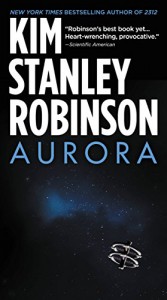
"Aurora" is the Sword & Laser book for May 2016. This is my first Kim Stanley Robinson novel and it focuses on the impact of interstellar space travel at sub-speed-of-light (10% of c), no 'hibernation' and several 'biomes' with a variety of life and agriculture to sustain life during the trip and to begin life on a new planet.
How does a ship with last for hundreds of years barrelling through space and what about the evolution and genetics over the generations of humans and animals and plants? These are the questions explored with our narrator, an AI, struggling with the concepts of consciousness and self-consciousness.
Some good points were made but the story fell flat several times.
 1
1

An early and not very good work by Mr. Murakami. Everything is here to see what he would later do, but this fell flat for me.
An easy and straight forward story to read but if you are not up for insight into existential thought it may not be right for you.
 1
1
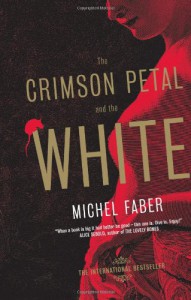
I have read a lot of Dickens and some Trollop too and this is perhaps how Mr. Dickens would write about London today; a lot more vulgar.
The first half of the book may be difficult for some readers as it is very pointed about prostitution. Not sex; but about prostitutes and prostitution. There is nothing erotic here.
The plot and characters are well drawn by Mr. Faber. There are no 'bad' persons in the story to drive the plot, just the characters, their circumstances, their choices and the consequences as they try to improve their situation.
The Narrator in book is an interesting device, but I feel the device either should have been used either more or used less. There were times in the middle of the novel when the story took over and was then interrupted by the re-appearance of the Narrator.
 1
1

This is the second installment of Mr. Grecian's "Scotland Yard's Murder Squad". What I want in a series is to learn more about the main character(s) as well as a good story. I did not get the former. And the latter was more of a 'whodunit' than a mystery/thriller. I will put this off as a sophomore jinx and look forward to reading the third book later this year.
 1
1

Nothing new here. But the West African setting makes 'The Informationist' a better thriller/adventure read. Also, the protagonist's back story is, if not believable, interesting.
This is the first book in the "Vanessa “Michael” Munroe series and I will read another one".
 1
1

I think Mr. Stephenson is more effective in the thriller/adventure space than in the pure sci-fi genre. The premise of the moon breaking apart is good and tension builds nicely, but after so many 'crap-can-go-horribly-wrong-in-space' episodes I began to think - Ok, let's get on with the story.
As an example, things go horribly wrong again and again in 'Reamde' but given all the geographical locations, modes of travel and a much larger cast of characters it doesn't feel as contrived as it does in 'SevenEves'.
Then there is the ending. Or endings.
I am not going to say the ending (the last fourth or fifth of the book) does not work. However, there is no segue-way to it and feels more like an appendage than part of the main story. My opinion is the 'first' ending would have worked better and expand the second ending as a sequel or perhaps a novella. Either way the last fourth or so of 'Seveneves' stands alone and should be separate, or at least distinct from the major part of the novel.
If you're a Neal Stephenson fan you have probably already read 'Seveneves'. If you have not read any of Mr. Stephenson's work I recommend starting with 'Snowcrash' or 'Readme'.
 2
2
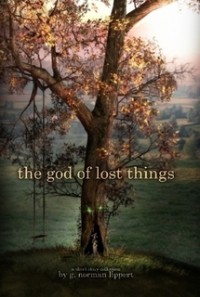
This is a good collection of 5 short stories.
Mr. Lippert is best known for his James Potter series. Yes, that James Potter.
I really like Mr. Lippert. I found him quite accidentally on Goodreads. In the summer of 2011 I was poking around some links regarding Harry Potter and hit upon James Potter. And I discovered Mr. Lippert had written two James Potter (Harry's eldest son) books.
And they were free.
And they were very, very good.
He also wrote 'The Girl on the Dock' and 'Flyover Country'. The former set in a magical universe similar to Potter and the latter was completely original; and also very good.
'the god of lost things' is a collection of 5 short stories. Not as good as the two above nor James Potter, but Mr. Lippert clearly has talent. I also have 'The Riverhouse' which I will read later this year.
I have the selfish goal of doing my part to support Mr. Lippert so he finishes the fifth and (very sadly) final installment of his James Potter series (skipping years 5 and 6).
Give Mr. Lippert a chance; try the first James Potter novel, "James Potter and the Hall of Elders' Crossing" for free and then get 'The Girl on the Dock' and 'Flyover Country'. They are inexpensive and in .pdf
 1
1

I enjoy reading Ms. Lutz's stories. After six Spellman Files novels this is a fresh take on disappearing and living under an assumed identity. Our protagonist has a past (which will be uncovered at the end) from some unknown incident during her senior year of high school that put her on the run. And the sudden death of her husband. Whom she claims she did not murder.
The pacing in "The Passenger" is just about perfect. Ms Lutz also creates an atmosphere feeling more and more isolated as Tanya Dubois runs and runs.
This is a good summer read.
 2
2
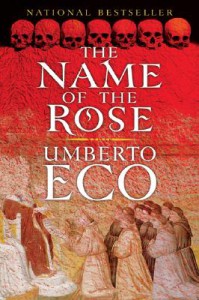
This has been on my 'to-read' list for 30 years. Within the last year "The Name of the Rose" popped up on sale from one of my eBook crawlers; I bought it and there it sat in Calibre.
When I read Mr. Eco passed away and I realized I had put off reading "The Name of the Rose" long enough.
A murder mystery in a 14th century abbey. An abbey with an amazing library and monks with a past.
I enjoyed the story/mystery and appreicate the penchant of medieval minds to believe in ghosts or other religious phantasia to drive the plot.
But, there is too much around the mulititude of Catholic sub-sects and papal politics that I know nothing about.
I experienced the same lack of background knowledge when I read "Barchester Towers" by Anthony Trollope about the Church of England in the 18th Century.
 2
2

I really do not understand why "MaddAddam" was written. This does not mean I did not like the book, but I have to wonder why this book was written. I can only conclude Ms Atwood likes the characters and needed some closure.
The events in "MaddAddam" take place after the end of "Oryx & Crate" and "The Year of the Flood". If you read the two above you will want to read "MaddAddam" too and while the back story is interesting it could have (should have?) been included in the first two books.
 1
1

Ms Atwood's "The Year of the Flood" parallels the events in "Oryx & Crate" from the perspective of a few members of 'Gods's Gardners'. As one would expect, a few of them also have connections to Crate and Jimmy (Snowman).
I enjoyed this book more than Oryx & Grate as it takes place in 'Pleebland' and feels much more open and dangerous than the 'Corporate Compounds' where Oryx & Crate primarily took place.
 1
1
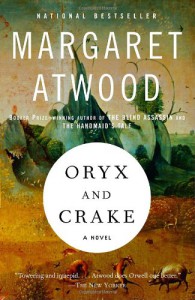
This is the first Margaret Atwood novel I've read. The MaddAddam series keeps raising its head on many sites I frequent because I read a lot of dystopian fiction. I blame William Gibson's "Neuromancer" for my inclination to this genre (and cyber/techno punk).
I will save for another day a my thoughts about why dystopian fiction is a popular genre, particularly with the YA population.
Ms Atwood sets up a very interesting universe and a more interesting lexicon to go with it. She uses combinations of words in such a manner that you cannot readily tell when the first one ends and the second one begins. At least that is the way it seems to me; example "pleebrats'. I appreciate word-play.
The novel flows backwards and forwards in time to tell the story of Jimmy (Snowman) and his relationship with Oryx and Crake. There is not a lot of hard science here and no back story as to how the 'corporate-compound' economy was formed but that is intentional and without those elements I found the story to be straight forward and not complex.
 2
2

Sometimes you just want to read a story; Mr. King is a master story-teller.
I have not read much of Mr. King's work and not for a long time. I have only read "The Stand", "Pet Sematary" and "Needful Things". However, three of my favorite movies are stories by Mr. King - "Shawshank Redemption ('Rita Hayworth')", "The Green Mile" and "Stand By Me ('The Body')". What great stories these are.
The first time I saw "Stand By Me", after the pie-eating scene, I remember thinking where do writers get these stories? My mind is certainly devoid of this type of imagination. Maybe the saying should be 'Those who can't write, read'?
While "11/22/63" is a bit bloated it is a good story. Of course I am partial to the 'Time-Travel' genre (See Connie Willis' Oxford Time Travel Series) but there is not a lot of time-travel in the book if you are not. Also, a lot of information about Lee Harvey Oswald. There is no conspiracy stuff; not the point of the novel.
If you do not read Mr. King because of his propensity toward Horror/Paranormal books this is an opportunity for you to give him a try.
 2
2

I enjoy reading about Ms. Brackmann's Ellie McEnroe and her adventures in China, though this third book in the series (and last?) feels flat. In each of the first two books we meet new characters who are not who they appear to be. And in China no one is who they appear to be.
However, there are no new characters and no new development of the existing characters in "Dragon Day".
This is still a fun read for a mystery and if you have read Ms. Brackmann's first two Ellie novels you will want to read this one too.
 1
1





